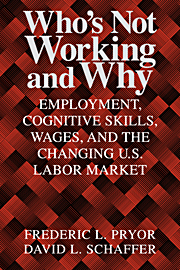Book contents
- Frontmatter
- Contents
- List of tables and charts
- Acknowledgments
- Introduction
- Employment, Cognitive Skills, and Job Displacement
- 2 Cognitive Skills, Education, and Other Determinants of Employment
- 3 Upskilling and Educational Upgrading of Occupations
- 4 Labor Force Displacement Mechanisms
- Wage Levels and Distribution
- Alternative Approaches
- Implications and Interpretations
- Appendix Notes
- Bibliography
- Name Index
- Subject Index
2 - Cognitive Skills, Education, and Other Determinants of Employment
Published online by Cambridge University Press: 25 March 2010
- Frontmatter
- Contents
- List of tables and charts
- Acknowledgments
- Introduction
- Employment, Cognitive Skills, and Job Displacement
- 2 Cognitive Skills, Education, and Other Determinants of Employment
- 3 Upskilling and Educational Upgrading of Occupations
- 4 Labor Force Displacement Mechanisms
- Wage Levels and Distribution
- Alternative Approaches
- Implications and Interpretations
- Appendix Notes
- Bibliography
- Name Index
- Subject Index
Summary
In this chapter we begin to present the empirical evidence to support the hypotheses described in Chapter 1. The starting point for our analysis is joblessness versus employment. What determines an individual's probability of obtaining employment? Is it race or ethnicity or education or cognitive skills? Why, for instance, is joblessness so much higher among African-American men than white men? Is it location? Why is joblessness higher in the center city than in rural areas? Is it parent's background – or age – or gender?
Although we cannot answer fully such questions, in this chapter we look behind the raw data presented in Chapter 1 to isolate the factors that determine an individual's probability of being employed. We look at all of the factors mentioned above, but our particular focus is on the impacts of cognitive skills and formal education, two factors that play crucial roles throughout the rest of this book. We show that our particular measure of cognitive skills – a person's average score on the National Adult Literacy Survey (NALS) – is partly related to years of formal education, but also has a strong independent component. We demonstrate how cognitive skills and years of education both have a separate and positive impact on a person's probability of being employed. Other things equal, a person with fewer cognitive skills is less likely to be employed. In later chapters we show how cognitive skills are related to other aspects of the labor market such as downward occupational mobility and wages.
- Type
- Chapter
- Information
- Who's Not Working and WhyEmployment, Cognitive Skills, Wages, and the Changing U.S. Labor Market, pp. 19 - 46Publisher: Cambridge University PressPrint publication year: 1999



